#also like this feels like an ideology that works in theory but not necessarily in practice
Text
u ever run into an ideology/philosophy/idea in the wild and ur like "im gonna approach this in good faith but im not gonna act like it gonna be easy"
#the ideology in question is antinatalism - the idea that having children is inherently unethical#like the person approached it from a sort of 'all ppl suffer + die and ppl never get to choose whether or not living is worth that'#so like i can kinda see ur point#but like ur still weighting suffering VERY heavily#also like life is what provides the information needed to make an educated decision of whether or not life is worth suffering for#also as an ex orphan born in china during the 1 child policy i have my doubts#like before we go around assigning blame we gotta remember that ppl r not guaranteed a choice in having or not having a kid#also like this feels like an ideology that works in theory but not necessarily in practice#like im gonna need u to give me way to implement it that doesn't turn into a 0 child policy#i guess being on adoption tiktok inherently puts my in proximity with the rest of 'how to ethically obtain kids' tiktok
3 notes
·
View notes
Note
Could you expand on Ideology re: Narrative in your Grand Theory?
Is it the thing that the player bases the character’s actions and arcs on, like the thing they focus their attention on when making choices?
Not sure if this counts as a good question, feel free to ignore if not.
Yeah, it's sort of a combination of how they make decisions and what they appear to be most comfortable with/what their strengths are. It's not prescriptive by any means. I should also note: this is specifically in the main campaigns in longform. I think Sam and Laura, for example, are way more comfortable taking a big risk in one-shots or miniseries (Arlo in Candela Obscura is perhaps the most clear example here), and I think Liam, Marisha, and Travis tend to play support/background in those.
To some extent, it's really hard to have character development while actually in the spotlight - that always necessarily has to come later - but Laura and Sam are really comfortable and skilled with their characters always working in their story as a consistent background theme, with scattered episodes of focus. I also think they're least comfortable being in a Big Spotlighted Arc; they both absolutely can do it but it's not what they tend to aim for. They do make big decisions sometimes, but they're often not decisions that put them front and center, and I say this with no judgment (and indeed, with a lot of respect) for those who do place their characters more front and center. I also find them both relatively risk-averse.
Travis and Taliesin tend to have very little aversion to risk. They make characters with pretty clear narrative hooks and are willing to leave quite a lot up to the DM, and will push big red buttons and deal with negative consequences. This is good, and frankly, while I think obsessing on your fave having A Briarwoods Arc (TM) is pointless (different characters need different things; Vex's story simply does not need that kind of central, concrete focus) it's also true that the reason Travis and Taliesin tend to get those is because they make characters for whom this is a natural thing to have, and because they are willing to put their characters on the line. I think Ashley is building up to this; she necessarily couldn't do so as easily when she was frequently away from the table, so Pike and Yasha have a lot of work in the background, but with Fearne she's been taking some pretty big swings. It's a style that requires a lot of confidence in your backstory and a lot of trust in the GM and a strong ability to pivot.
Liam and Marisha tend to have milestones. Marisha skews the furthest towards this; Liam can be a Big Red Button guy and he absolutely has the GM trust/willingness to lose that requires, but he's a little too controlled in his character's goals; I'd say that like, the spectrum here is Sam and Laura as the most background development, Ashley falling between background and big red button, Travis and Taliesin clearly in big red button, Liam between big red button and milestone, and Marisha solidly in milestone. The best way I can describe it is usually their characters have clear tasks to achieve, and they don't really change until the end. Keyleth is the clearest version of this, with the Aramente steps, but Beau's intermittent meetings with the Cobalt Soul also count. The other way I described it is that Big Red Button has the risk first and then the character development as they deal with consequences; Milestone has a big moment as a capstone to the development that's been happening. This style requires a pretty thorough character backstory because it needs to be proactive - it works best for a very driven character, and also requires someone who's willing to talk to the GM out of game to make sure they're broadly aligned (again, nonjudgmental; I think that communication like this is a good thing).
80 notes
·
View notes
Text
Water 7 Thoughts

I truly think that Zoro's words wouldn't have kept up as much morale as they did if Usopp hadn't apologized and come back. If all, Usopp's apology validated Zoro's words, given I'm not sure what it would've looked like (how valid his words would have been) if Usopp hadn't come back.
The problem with the crew seemingly willing to leave Usopp looks wrong on so many levels that it bothers me. But thinking of the potential fallout afterward (if Usopp were left behind), in that regard, clears up some things for me. I wholeheartedly believe that Luffy was willing to compromise with the team on that level simply because he truly believed that Usopp was going to apologize one way or another. After all, there was a reason why Luffy chose Usopp. Without Usopp returning, I'm not sure if the team would've been strong enough to continue onward.
I can get past Zoro's need for that apology when I look at it from a couple different perspectives. But sometimes I feel as though the fandom tends to warp some of Zoro's ideals because it gives others (admittedly myself) leeway to antagonize him to a certain level. People always praise him for his loyalty to Luffy, yet, if he's commonly considered a first mate or vice-captain (which IS disputable), that doesn't necessarily (to me) bring morale to the overall collective of the Straw Hats either, if Zoro does everything in Luffy's best interest, with the false pretense of wanting to keep the crew together…how can a group stay together if Leader 1 trusts the crew/group but Leader 2 doesn't? It leads to a bit of resentment on the rest of the crew members' end. Sure this ideology barely works in the armed forces (I need to gain some insight from my army veteran mother to see if this better checks. Edit: she said that knowing how to find a balance is what works. But overall, you have to look at the collective. There are bad leaders in the army because of what I mentioned), but the Straw Hats aren't a typical pirate crew and are Nakama. So...that's why I'm not so up on the take of agreeing with Zoro's words when it doesn't look like power dynamics on the crew are acknowledged as drastically as they are in the Water 7 arc; which leaves inconsistencies with the overall narrative. Also, one must consider the age of the crew members.
My feelings toward the end of the post-Enies Lobby arc consist of disappointment, frustration, and being ill of ease. I would have accepted Zoro's decree if it hadn't meant leaving Usopp behind. Sure, it would take a while for the crew to trust Usopp again, but he did participate in the rescue mission and despite what Sanji heard, Usopp would have eventually let his own guilt eat at him and he would've inevitably apologized, especially if he were to have gotten on the Thousand Sunny without the apology, he would've eventually given them one. Usopp should've been given that benefit of the doubt since Luffy had already forgiven him.
Usopp was a friend too, who had his flaws. Why forget that? Yes, maybe the situations are slightly different, but to see how happy the crew were to get Robin back, and just let Franky on board because of his showcase at Enies Lobby and his engineering prowess, why wasn't Usopp given that grace? We can only go on theory, and come up with this hypothetical convo that happened after the whole saga, but all of it just looked wrong.
Usopp deserved a second chance, regardless.
#water 7#post-enies lobby#one piece#usopp#op usopp#one piece usopp#god usopp#sniper king usopp#usopp one piece#straw hat usopp#sniper king#captain usopp#luffy v usopp#usopp v luffy#usopp apologizes#usopp water 7 defender#enies lobby#mugiwara#nakama#comic relief#zoro#roronoa zoro#one piece zoro#strawhats#wesleysniperking#my opinion#water 7 arc#enies lobby arc#straw hat crew#biased thoughts
26 notes
·
View notes
Text
while it’s important that rj understood how prolonged exposure to trauma would mess with you psychologically on various axes - mental, emotional, spiritual, physical - it’s also very significant that he put in the work to question and explore how people could go about healing and recovering from their experiences with a realistic attitude.
sometimes they don’t heal - they don’t understand that they need healing, dismiss their instincts, or manage to bury all the complicated emotions they’re feeling. it’s seen when mat suffers from a severe case of survivor’s guilt whenever he survives a battle, and this is observed more obviously when he escapes from ebou dar without managing to save all the windfinders; he also doesn’t have the vocabulary to express why the abuse he suffers at tylin’s hands feels wrong, and his cultural background and his tendency to lie to himself prevents him from examining why this is the case. rand is simply incapable of dealing with the sheer physical, mental and emotional stress he’s subjected to without a support system to back him up - support that he’s specifically unwilling to ask for because he doesn’t want to be put in a position of vulnerability just like mat and has a very unique relationship with the level of autonomy he’s afforded and the abuse he may be subjected to as a result of his madness - and resorts to unhealthy coping mechanisms and internalises traits that also serve as an allegory for ideologies that toxic masculinity directly feeds off of; he reacts to aes sedai very badly although he eventually unlearns that instinct; he’s extremely suicidal, and lews therin works as an indirect metaphor for depression. egwene feels the need to be in a position of power whenever approaching a certain relationship (be it romantic, platonic or otherwise) after her time as a damane, and is often uncomfortable with setting down her guard unless she trusts the people she’s working with; rj has a very complicated track with his depiction of corporal punishment but he also touches on how it enables people in power to take advantage of it to abuse the people under their control through egwene’s arc. rand specifically laments how the sort of stigma and alienation that male channelers face will never really go away because of the fear ingrained into popular belief, and that’s also a very accurate depiction of how certain mental illnesses are received by society.
but rj puts in the extra work to explore how people who have access to support systems and are on the receiving end of patience and compassion are able to get on the path to recovery. he has nynaeve & co deal with the problem of deprogramming egeanin, the sul’dam and damane who’re thoroughly brainwashed by the seanchan. juilin is able to help amathera recover by being very sympathetic to her situation and protecting her from difficult situations that could trigger her ptsd. rj specifically spends a significant amount of time letting joline, teslyn and edesina slowly encourage the seanchan channelers to entertain the idea of their ability not being a curse and to even train to control it at the white tower. the maidens are able to get a read on rand’s discomfort with the dark and small spaces post dumai’s wells and are kind enough to always leave a light on in the dark for him; they also push rand to take his meals and care for himself. the asha’man are explicitly recognised as a group which needs to unlearn some of the toxic ideas encoded in the founding principles that rand introduced. rand himself is recognised to be in dire need of help again in the latter half of the series, although we never got to see the culmination of that arc, unfortunately* - but I have a theory that his arc as a hero is tied very closely to his ability to recover from the various traumas he’s subjected to.
wheel of time takes a very realistic stance on mental health and ptsd. more significantly, it recognises that trauma might not necessarily bring about a positive transformation in a person. and that’s okay.
*cadsuane’s arrival is the only one I can’t get a clear read on, and feels so obviously doomed to disaster from the very beginning given how her personality clashes with rand’s and with her introduction with the intent of controlling rand and never respecting his opinions or autonomy - but given how she’s criticised by the narrative, I’m inclined to believe that min’s reading might have potentially been fulfilled in a bittersweet way as her readings often are. if rand learned how to embrace his humanity again, I can’t imagine that she would have ever had a part to play in it that involved compassion or understanding.
#he wasn't traumatising rand for the shits and giggles I would've loved to see where he would have gone with him though I have my own theory#I’ll save that for the super long rand post though… if I ever fucking finish it#text#HE least of all people would’ve kept pushing the trauma button without intent and just for the sake of Angst. unlike a lot of other authors#I have no idea what he was doing with perrin though lol it has to be said… he really is the weakest point in the series#I know people enjoyed dragonmount and sanderson’s take on how rand and egwene suffered trauma to eventually become Stronger#but that’s absolutely not a realistic depiction and it doesn’t work for me sorry to say.#I also Do Not Get dragonmount at all. it’s like if you pulled a rhetoric about love and living out of your ass when rand is suffering in#THIS life and THIS context… he walked in with some new character conflicts & adressed THEM instead of what rj had already written for rand.#wheel of time#wot book spoilers#rand al’thor
162 notes
·
View notes
Note
omg you do accounting? that actually sounds kinda fun (I know it famously isn’t but tedious but not necessarily very complicated work is really fun to me 😭 bc you can multitask usually tho maybe I don’t know anything so feel free to correct me). Also I’m taking a poli sci course this semester wish me luck 🍀
man I sure hope so cause I'm at the end of my rope 😂
I like it so far and I've done well in my classes and I know People In The Industry who can help me out
I like tedious shit and I love rules. a problem I've had at other jobs (retail and food service mostly) is the presence of rules but also an abundance of not following those rules. the fun thing about accounting is if people don't follow the rules someone goes to jail! so.
👀👀 what poli sci course? I really loved studying poli sci and reading theory. ethics and ideology, my beloved
#ask#I-just-want-to-see#shout out to my tags on a car manifestation post being so Perceived lol#this is fun
6 notes
·
View notes
Note
hey, i'm a transgender person who came across your blog while looking through some tags. i don't necessarily agree with much of your views (i'm very much not a gender critical), but your posts have given me a new perspective on detransitioners. i didn't hold any animosity towards them before (or much of an opinion at all really), but my understanding of them didn't have much depth. i just wanted to say that i feel a great amount of empathy for you. transitioning might have not been the answer for you, but i hope someday your dysphoria dissipates and you're able to find peace. you aren't a freak for pursuing a path that didn't end up being right for you, you simply tried to alleviate your dysphoria in the only way you knew how to. i'm sorry it didn't work out. and i'm sorry so many of my peers treat detransitioners with vitriol when we really should be extending our support to them.
i apologize if this came off as me pitying your situation. i'm not good at conveying words through text, but i just want you to know that my sentiments are genuine. i'm sure this is kind of a weird thing to get in your inbox (probably even weirder coming from a transgender person, sorry). i suppose we're at odds with each other, but i hope you are able to find happiness and someone who will love you for you.
Thank you so much for this message, sweet. One of the driving forces in my decision to publish my mostly unfiltered turmoil in relation to my dysphoria (beyond the fact that I just need a place where I can drop it and forget about it) was/is the wish for people to gain this very perspective through my blog. I find that a not-insignificant portion of the gender-critical community consists of people who (self-admittedly) do not actually experience long-term dysphoria to the degree that I and many other transgender people experience (meaning they're just parroting talking points without a personal, in-depth understanding of what it is actually like to hate yourself and your body to such a degree and be so fucking desperate to just make it stop), while the wider detransitioned community (contrary to somewhat popular belief) do not actually criticize gender identity as a concept, and in fact, often continue to find comfort in upholding it post-detransition. I also find that the ways in which dysphoria is approached and talked about in both communities can be a bit... shall I say... missing-the-forest-for-the-trees in that there is so much emphasis on "curing" dysphoria (whether through the means of transition, therapy, or simply "growing out of" it) riddled into the ideologies that when they come across someone like me—someone who has continued to have severe, persistent dysphoria through transition, detransition, and pretty much everything under the sun—they, very often, have no idea what to do or say because I exist outside of the plane of generalizations they have based their beliefs off of. I believe, if you want to have an honest conversation about mental health, you have to acknowledge that you can do everything "right" and still suffer—I am living, breathing, walking proof of that shitty fact. I choose to be pragmatic about it, to show that both "solutions" to this internal nemesis have caused me pain in different ways, because I think it's way too easy for people—including myself—to forget that real people's stories are often much more nuanced and complicated than mere theories would have you assume. Maybe that's cliché, dramatic, pessimistic or self-defeatist of me. But it's messages like yours that show my decision has made the intended impact.
You have nothing to apologize for. I don't read your message as your pitying my situation (and even if I did, I'd totally understand, considering the content of some of my posts lmao). I'm so glad to know that you have found some value in what I have shared here, even more so that you read through my blog and came to a place of compassion instead of defense. I'd go out on a whim and say we're not so at odds with each other, seeing as how I do still live my offline life as a transgender person currently, although I understand how many would disagree with me on that considering my perspective. Especially in this past year, it can be very hard for me to not look at this clusterfuck of an issue and want to throw back all of the anger and hatred that the trans community has shown me in the past, I'll honestly admit that—but through it all, I try to hold out hope that we will move past this weird timeline of extremism (on both sides) and we will all be able to come to a place of mutual understanding that will benefit all dysphoric people who precede us.
12 notes
·
View notes
Text
Please Read: Message to Followers
This blog has a small following and is relatively new—I tend not to pay attention to its followers because it isn’t my main blog. But I scanned through them recently and noticed that there are some who espouse beliefs aligned with trans-exclusionary radical feminism. I will address this.
I would like to emphasize that this blog is not a safe space for anyone—it is a brave space wherein Lorde’s words challenge us to struggle together and embrace our differences as a source of power against oppressive systems. This means that while I support rigorous debate and criticism and struggle with issues and theories about liberation and oppression, I cannot allow it to go unsaid that I wholeheartedly am in solidarity with trans and gender non-confirming communities across the world.
Audre Lorde’s work is often appropriated or taken out of context—not just with brief quotes that occlude the meaning of a larger text, but also with ahistorical and anachronistic applications. The context in which she wrote was one where she was pitted between a Black Liberation movement that at times was homophobic and sexist, and a woman’s liberation movement that was often racist and classist and sometimes homophobic (depends when and where you went). Lorde’s work deals heavily with the material conditions in which she lived, something that is worth acknowledging.
I won’t pretend to speak for Lorde because I am not an expert. But I know that she spoke out against biological determinism of gender and sex identity when she co-signed the Combahee River Collective Statement. I know that she explored and felt deeply the connections between womanhood and bodies in her reflections on her mastectomy in The Cancer Journals and A Burst of Light. I know that she also spoke out against pornography and in favor of the erotic as a source of female knowledge. I also know that in the same essay, she wrote,
“Beyond the superficial, the considered phrase, ‘It feels right to me,’ acknowledges the strength of the erotic into a true knowledge, for what that means is the first and most powerful guiding light toward any understanding. And understanding is a handmaiden which can only wait upon, or clarify, that knowledge, deeply born. The erotic is the nurturer or nursemaid of all our deepest knowledge.”
My point is that as a black lesbian feminist theorist, scholar, and activist, she is a complex figure with opinions and perspectives that don’t necessarily align with any singular ideology or belief. She resists easy classification, but this opens her work up to appropriation.
I know that one of the central messages of her work is how interlocking systems of oppression work against oppressed people to erase our differences into a singular deviance, or they allow us to cannibalize ourselves through infighting and a refusal to give up access to oppressive power. Lorde imagines a different power, one that is sourced in difference, one that feels those differences as a fount of knowledge and a fundamental necessity of liberation.
I don’t know what all this means in the context of this blog and a few of its followers who support trans-exclusionary radical feminism. But I will reiterate my support for trans and gender non-conforming communities and my commitment that this blog be a space where different experiences of womanhood are not erased or demonized or misrepresented. People who disagree with these tenets are always welcome to unfollow.
And to finish, I would like to say that Audre Lorde told her students in a poetry workshop, “Don’t mythologize me.” She said this originally to encourage her students to continue writing and creating on their own and in their own communities, and that they didn’t need her to continue the work. And I think it applies here as well. Take that as you will.
-J. ( @slowtides )
21 notes
·
View notes
Note
Out of curiosity, why do you like Hegel so much, yet dislike philosophers inspired by him, like Marx? I get the impression you don't see a lot of Marx's writing as...idk rigorous? Intelligentual serious? But most of the people I see making that complaint oppose continental philosophy in general and want significantly more mathematical rigor in philosophy, which you don't seem to agree with. So I'm not really sure what your objection is and what you feel makes Hegel different
The first thing here is that Marx was not directly inspired by Hegel and, according to Hegel biographer Terry Pinkard, seems to have read very little of him. Marx studied under Bruno Bauer (one of the many attendees of Hegel's lectures who also probably over-exaggerated his connection to Hegel) and Marx also read summaries of German idealism that were written by Heinrich Moritz Chalybäus, who is responsible for the infamous misconception that Hegelian dialectic had anything to with the essentially meaningless triad of "thesis-antithesis-synthesis." Following Walter Kaufmann, most Hegel scholars these days will now outright assert that "thesis-antithesis-synthesis" to be a misrepresentation of Hegelian dialectic, rather than trying to compromise with the Marxists. So a decent part of the reason I dislike Marx (and more accurately, his followers) is that without Marx, there would be far fewer misconceptions about Hegel. As for Marx taken by himself, I have some rather strong objections to social conflict theory, but that could be its own long post.
I'm also much less bullish on the idea of "Continental" philosophy, less so even the more I read of it. Continental philosophy is a somewhat loose term, which often includes not just Hegel, but also the rest of the German idealists, and technically even Kant and his contemporaries in some formulations. But usually in my experience when people object to continental philosophy they're objecting to the 20th century German and French thinkers from Husserl and Heidegger through Foucault, Derrida, and Deleuze, all of whom are imagined to have taken their lineage from Hegel, Marx and Freud, while the "Analytic" philosophers took their common departure with Kant and followed Frege, Carnap, Russell etc. And at some point in the 1920's everyone realized they couldn't talk to each other anymore.
Like all nice and clean histories of philosophy, though, none of this is really true if you look any closer. Both American pragmatism and early British analytic philosophy were heavily influenced by or in reaction to the Hegelian British idealism, and in the past 50 years many analytic philosophers have re-evaluated Hegel in light of philosophers such as Quine and applied Hegel's work more directly to their own metaphysics, Robert Brandom being the most notable example of that. So I don't really believe that the common notion that Hegel is the first exclusively continental philosopher is useful or accurate now, or that it ever really was in the past.
Meanwhile, most of the 20th century and especially post-WW2 era continentals apparently took their notions of Hegel from Marx, and so they aren't necessarily representing much if anything of him accurately. For example, I spent a decent amount of time a while back trying to figure out if Sartre had actually ever read Hegel before citing him, and most of the evidence pointed to "probably not" which seems to be a broader trend in how citation works within that subfield. Even charitably, I think it's hard to avoid the conclusion that at least a large chunk of the last 80 years or so of Continental philosophy has been primarily about fraudulent scholarship and obscurantism in the name of vague gesturing at some rather distasteful social and political ideologies. I think it's a rather shameful era of the history of philosophy, and I hope most of it is consigned to the dustbin of the past.
As for why I like Hegel: I tend to see Hegel as a synthesizer (in the general sense of the term) of everyone he read who came before him, especially the Greeks. He certainly didn't invent dialectic (according to Plato, that was Zeno of Elea), but he formalized and modernized it, and then used that formulation to define the interaction of a large number of broad concepts such as culture, religion, art, philosophy, etc. I see his dialectic as a useful shortcut when analyzing logical statements that use words as concepts: since it doesn't require an exact definition or understanding of a concept before attempting to reason with it, but instead clarifies that concept itself in the process of reasoning, it avoids the preliminary hurdles of trying to establish a rigid exact definition that might not prove to be useful.
In addition to finding the dialectic method of conceptual analysis itself to be useful in its own right, I also think that many of these concepts still have contemporary relevance, especially the conflict between aesthetic and moral concerns that leads to the much-misunderstood "Death of Art," or the conflict between freedom and authority that leads to "positive" freedom found within the State, both of which have influenced my own thinking. While these are also obviously not ideas that you must take from Hegel, as they can certainly be found elsewhere, within his system they have a common unity that makes understanding them together require less effort. But also, admittedly, you do need to invest the effort to understand his system first, so it's hard to say if it's worth it. At this point I mostly don't recommend Hegel to others, but I won't discourage anyone either.
However, while I don't think Hegel was a "mystic" or any such nonsense like that, I do fault him specifically for popularizing the idea that dense, esoteric prose is some marker of profundity, which if anything is the true influence the dreaded later "continentals" took from him. The difference between him and them is that if you read secondary literature on Hegel from critical scholars who study him (rather than those original thinkers like Kojeve or Zizek who take their influence from him), you'll discover that there is much more substance beneath that dense surface, which will make you wish he didn't write in that tortured, horrible style to begin with! But if you do this with Derrida or Deleuze you will quickly discover that almost no such secondary literature exists, and that what does exist either makes it evident that their dense prose lacks any such substance beyond some trivialities, or is itself written in the same tortured style for the same obscurant purpose. Caveat lector, I'd like to be proven wrong about that last part, but if there is something hidden in there it's value-negative for me at this point to look for it.
11 notes
·
View notes
Note
last ask i meant key points instead of bulletpoints lolol :/ english isnt really my first language, sorry !!! and yeah, specifically those lens. sorry if it wasn't clarifying at first
nothing to be sorry for! but yes i have thought about succession in relation to fisher's capitalist realism a lot lol.
first of all, there's fisher's point about how "all that is real melts into pr"—ie, capitalism reduces the real into appearance. waystar is kind of the exemplar of this trend insofar as it's a media company, and we see logan make this type of argument a few times: it doesn't matter what's real, it matters how things look, and he can control appearances (like when he plants tabloid stories or alters public opinion on the president).
there's also the way fisher talks about neoliberal subjectivity, which i see as applying particularly to kendall (ideologically flexible in the way that capitalism is, and driven by the logic of constant pointless self-improvement ie auto-exploitation). i've sketched out an attempt to theorise kendall's drug use in particular using deleuze's remarks on control societies and fisher's discussion of the 'debtor-addict' as the figure of such societies.
although fisher makes gestures toward uncovering a more general subjectivity under capitalism, i do think a lot of 'capitalist realism' is very specifically engaging with the british middle class, and you can see this for example in the section on 'depressive anhedonia' lol. which is not necessarily a bad thing; the book clearly has certain roots in affect theory / psychology, and it's possible for it to be saying something useful and interesting about middle-class affect without necessarily being a totalising manifesto. i would argue that marx's paris manuscripts often move into similar territory in regards to an imagined (and largely imaginary) proletarian.
but that brings me to i think the central issue with both succession and 'capitalist realism,' which is, uh, the capitalist realism of it all lol. like, the main thrust of fisher's critique here is to point out the ways in which capitalist political-economy is presented as the only viable such system. and obviously, fisher disagreed, and the book is like 80 pages long and is more about explaining what capitalist realism is than refuting it, which is fine. but it bears saying that there is a certain strain of leftist (sometimes not even leftist) thought that leans heavily into the nihilism and cynicism that some people pick up from this text.
which is not really something i want to litigate in regards to fisher in this post lol, but i do feel like it's something worth chewing on in regards to succession. in a show that is driven by character studies of murdoch pastiches, what would a leftist or liberatory ending look like? these characters and their real-world analogues are trapped in their capitalist microcosms, which are located within larger capitalist structures; if there's no escape for them, is the show inherently endorsing the idea that capitalism is inescapable and omnipotent in general?
i will show my hand here and say i think an ending where the roys 'escaped' in any way would suck, honestly. this is not because i think they 'deserve' to suffer or be punished (i don't do that kind of carceral logic) but because i think it would feel saccharine and insipid to end on a note of, like, individual liberation for this one family whilst capitalism marches on or whatever. but this doesn't necessarily mean that any ending where they're trapped is good, or compatible with liberatory leftist politics, or narratively satisfying.
ultimately i also think this gets at some other issues fisher was interested in throughout his work: like, when art is made under capitalism, that limits both the meanings intended by the creators and the meanings audiences read from it. ie, what type of genuinely liberatory art is possible if it's doubling as a commodity? i don't ask that to let succession's writers off the hook lol, and if the ending is bad and unimaginative then it's bad and unimaginative. like, i'm not going to sit here pretending otherwise. but i do also wonder what ending is possible that would not be read as somewhat cynical regarding the possibility of escape from capitalism.
anyway i don't have a developed aesthetic theory here and i also don't yet have the succession ending, so like.... i reserve judgment until then lol.
#i always forget to readmore my long ass posts. here u go#blood sacrifice#i should have made a better tag for like.... talking about the show's politics in an external sense.... wot evah
14 notes
·
View notes
Text
Perhaps the most underrated MLA member?(it's a Rant)
Well my first little rant or something like that, I feel some anxiety! I felt also the urge to write this because I think that Hanabata has the less screentime among the other MLA members both in the manga and the anime, that makes him so underrated while he was the first character in that organization that I really started to love. Lambda and her appreciation for the wrong bnha characters as usual.

Anyway. How to start, thinking about him and due to his little relevance in the original plot I think this character is ambiguous enough but yet evil. Yeah this was also made to make the League look like the "good" villains in the MVA plot so I expected that, and I wasn't expecting him to be so grieved by Curious' death but his coldness still amazed me a little bit like his determination in using his comrades who actually trust him as human weapons towards the League, and ,even if they are devoted to him a lot and sacrificed themselves voluntarily for the cause, he didn't care about them and seemed to feel nothing watching them killed like Curious did.

I love the little contrast between him and his quirk: the incite is really unsettling as a passive quirk but fitting for a politician and a demagogue. The most interesting thing for me is that it doesen't work without others because a leader isn't anything without his sheeps. If you cut off his electors Hanabata is just a normal man like others are not a powerful B-ranked villain, but still even being weak compared to other characters I love and laugh seeing how he is so secure and arrogant especially towards Spinner.
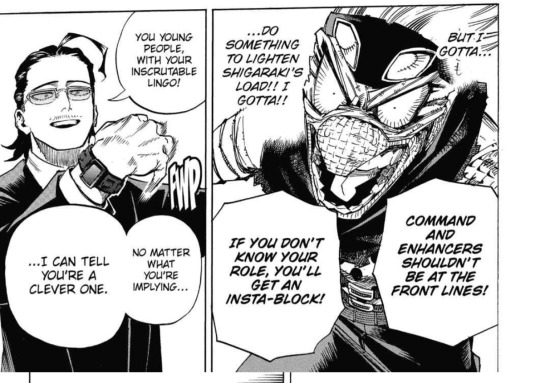
A friend of mine made the hypothesis that he can only use the Liberation ideology just to have more followers and using it as an easy discourse to have more electors but I don't think so necessarily. It isn't totally wrong but I feel also that he actually believes in that ideal seeing how he acted towards Re-destro, but an ideal brought to the extreme similar to Geten's since he humiliated Spinner for his weak quirk.
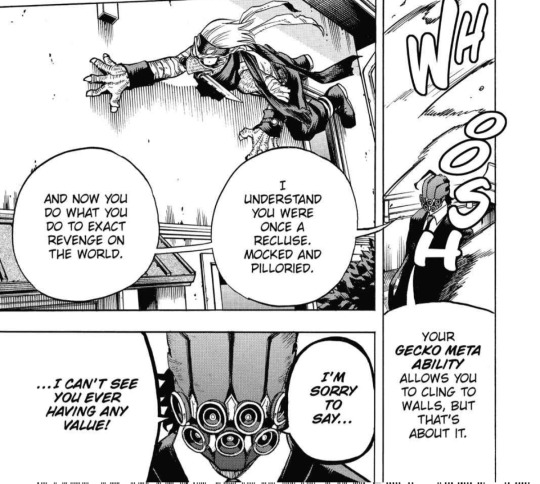

As my personal fanon theory I'm trying to write simple backstories for some villains, it isn't easy but I don't want to give him a tragic backstory, it doesen't fit for him at least to me. I'm thinking about that.
I'm not so good with rants but at least I try
#my hero academia#plf#boku no hero academia#meta liberation army#bnha#anime art#hanabata koku#koku hanabata#mha trumpet#trumpet mha#bnha trumpet#meta liberation army deserves better#not me redoing this because tumblr shadowbanned me#aka lambda bnha art
28 notes
·
View notes
Text
Likely Possibilities for Crowley's Previous Angelic Identity:
I'm sure plenty of people have done this at some point or another... but I'm doing it anyway XD. It's fun to think about, so I decided to give my two cents.
FIRST, let's lay out the clues we've been given:
Crowley worked on the stars
Crowley was a "Throne" or "Dominion" or higher
It's implied that he and Saraqael worked together at some point
So, first let's review the hierarchy of angels:
Hierarchy of Angels (according to Wikipedia anyway):
High:
Seraph
Cherub
Throne
Middle:
Dominion
Virtue
Power
Low:
Principality
Archangel
Angel
Note that this is not the *only* existing hierarchy of angels; I chose this one purely for similarities in terms.
This pretty much confirms what fans of Good Omens guessed: Crowley was somewhere higher up on the social ladder. That limits potential possibilities to anyone who was a Dominion or above. So, keeping that in mind, I looked at all the angels with that ranking (who Wikipedia had info on; admittedly there were entries with no information to go on, which I eliminated).
What I came up with was this:
Pahaliah: Throne
Guardian of Redemption
Truth/Wisdom
Wikipedia describes as "bearing the mystical name of God... "the Ineffable Name."
It feels right for Crowley to be some sort of guardian of truth/wisdom. His main problem with God was in seeking the truth: he asked questions. Not to mention, part of being wise is knowing when to take suggestions from others. I also think the Ineffable thing could be kind of funny. Throughout the series Crowley shows such distaste whenever Aziraphale attributes something to God's Ineffable Plan. It would be interesting if there were something more personal in that distaste.
Agiel: Seraph
Intelligence
Associated with Saturn
I chose this one for kind of similar reasons to Pahaliah: the association with intellectuality, which in turn, lends itself well to Crowley's need for questions. The fact that this angel is associated with Saturn could also be a helpful connection in that we know that Crowley worked in the space department (so to speak). That having been said, I acknowledge that a lot of angels are associated with specific planets, so that doesn't necessarily mean anything.
Gadreel : Cherub
I really only chose this particular angel because they're "responsible for deceiving Eve." As the serpent, that was literally Crowley's job description.
THERE were a couple of other entities I thought were interesting to consider, like Azazel and Raphael, but I ultimately decided that it didn't make sense/there wasn't enough evidence one way or the other.
In terms of Raphael, in particular, since I know that's a popular theory, I personally think the Aziraphale-Raphael connection holds a little more water. But that's just my own personal opinion.
However, all that being said, what we have to consider in the end is that Neil Gaiman and Terry Pratchett didn't necessarily strictly keep to one particular system/religious ideology.
Take these instances, for example:
Saraqael: There is an angel with that name (also known as Sariel). But the only real connection between the angel in the show and the angel in the source material is space. We know that Saraqael and Crowley worked together. In the original source material, Saraqael taught men about the phases of the moon. Hence, it makes sense that they would have worked together. But that's really the only thing connecting the two.
Muriel - Muriel in the show is the lowest order of angels. But the actual angel Muriel is a Dominion (though I admit, it's likely Muriel wasn't intended to be based on anything in particular).
The hierarchy of angels - Neil Gaiman has actually laid out a fairly specific hierarchy of angels. According to it, Aziraphale is intended to be upper-middle management, basically. However, if we're going off of the hierarchy above, as a Principality Aziraphale should be much lower on the hierarchal ladder.
All of which is to say, this is kind of a moot point without knowing HOW EXACTLY the authors modified the hierarchy. But it's still fun to theorize!
2 notes
·
View notes
Note
16, 13 & 5 :))
already answered 16 + 5 but!
13. What were your least favorite books of the year?
the bear and the nightingale by katherine arden and i'm thinking of ending things by iain reid.
i also read both right-wing women by andrea dworkin and my body by emily ratajkowski and had very mixed feelings on both. on the one hand there were a lot of things dworkin said in her book that really resonated, especially when she's describing right-wing women and writes:
Looking for a way out of the sex-class system....right-wing women look at feminists and they see women: inside the same boundary, victims of the same crimes....Their response to what they see is not a sense of sisterhood or solidarity--it is a self-protective sense of repulsion.
but at the same time, dworkin's work is so steeped in gender essentialism that it undercuts a lot of her points. like, it's impossible to ignore the fact that dworkin's work contributed to the foundation of a lot of terf ideology, and i actually highlighted this quote as incredibly ironic:
Antifeminism is also operating whenever any political group is ready to sacrifice one group of women, one faction, some women, some kinds of women, to any element of sex-class oppression...
like!! terfs will reference and quote dworkin all the time as if they are not literally doing what dworkin describes as antifeminism in this quote by sacrificing trans women as if that can somehow save them from misogyny. u simply cannot deny the irony here.
anyway part of engaging w feminist theory is getting a full scope of the history and fractured thought within the field so! it's not that i disliked the book per se more that i'd just want anyone reading dworkin to be reading trans and queer feminism too and to be able to locate and understand the flaws of the gender essentialism baked into her work.
and with my body...like again it's not that i disliked the book it's more that i felt like ratajkowski was like. presenting her memoir as though she was making this big critique of patriarchy when her sort of overall conclusions seemed to point towards finding power within the system rather than dismantling it. which is not to say she makes no valid or relevant points! but there just does seem to be like. at the very least a lack of self-awareness about the ways in which her finding ~personal empowerment~ is very much coming from a place of privilege and is not necessarily conducive to systemic change. girlboss feminism vibes yknow
end of the year book asks
7 notes
·
View notes
Text
UnFair Dealing in Cobrin'Seil — III
Of course, in Cobrin’Seil, there are player character options that are Fair Folk. This means that much of this mystery runs abruptly into a wall of making something manageable for players to handle, and for those player characters to have an opinion on something that they have experience with just by dint of existing.
In Cobrin’Seil, there are three major cultures that have a connection to the fey (Elves, Eladrin and Dio Baragh), and mixed in with them there are some minor ones (Pixies, Satyrs, and Drow). There are also cultures outside of the Human-centric core that have their own traditions of interaction with the Fey, which includes Orcs and Goblins. Also also there’s the culture of the Terzocco, which is a country with a variety of heritages in it, that are fundamentally under the Fey’s control, and… complicated.
To round out the treatment of ‘the Fey’, then, here is a consideration of things unique to the worldview of the Fey that player characters can have as members of those communities, and how the way the world works influences their perspectives.
Remember, the worldview and theories around how the Fey work are not in any way true or false as facts in the world. You can have a Fey character who genuinely believes that they are an extrusion of Green Mother and everything they understand about personal choice or narrative or wants and needs is just those vibes and demands translated in a way that makes them feel like an individual and not have that be regarded as mental illness. It would be comparable to a modestly normal religious view in our real world, after all.
Glossary Note: Conventionally, the term used in D&D for this mechanical package is race. This is the typical term, and in most conversations about this game system, the term you’re going to wind up using is race. For backwards compatibility and searchability, I am including this passage here. The term I use for this player option is heritage.
Pointy Ears And Endless Years
First of all there are the collection of Fey people under the heading of the ‘First Elves’ group. That is the Eladrin, the Elves, the Drow and the Shadar-Kai, along with the half-elves if you count them. In any situation, the history of these cultures stretches back only so far as they can remember, with the Shadar-Kai cultural history only reaching back to the point where they can remember being imprisoned, and the Drow to the founding of the Underdark. In both of these histories, the Elves already existed and were a known people, which fits with their old history, and then older than even them they say are the Eladrin. This narrative fits for the cultures’ views of themselves, and it’s only modestly untrue; Eladrin and Elves come from the same place and time, and it’s only a matter of who keeps better books that creates the impression of one being older than the other.
To each of these, there is a lineal relationship, that plays into their story. Drow consider themselves to be Fey, and therefore culturally adorn themselves with what they ideologically consider that to be. They are Fey, in the sense that Fey magic works on them and detects them, but their actual connection to the Feywild is pretty stunted to just the vast, brooding Manse that is the underdark. Shadar-Kai consider themselves culturally separate from the others with their stolen Manse that is the Shadar-Kai fortress in the Shadowfell. Both of these cultures see themselves as rebelling against a forebear for some way, and that means both of them need the other cultures present before them in history. The Elves that became Drow, necessarily, need to consider the Elves older than them, then. Similarly, the Elves tell stories that Elves are a naturalised, living form of whatever the Eladrin are.
The Eladrin stand at the top of this hierarchal view of history and therefore, write a lot of the books explaining it, as best they understand it and as complies to their view of what history should be. Ironically, this means that Eladrin control the self-image of these Fey people just because they are the ones who set the first principles of what that means.
As a Fey of this grouping, you inevitably have some relationship to the feeling of the presence of the Feywild. To you, the Feywild is something that just exists, you have a familiarity with it, and you recognise it as part of infrastructure of life. Even the Elves who don’t use it still recognise its importance to their ritual and magic. It’s likely if you’re an Elf, you see a druid tapping the Feywild to encourage growth or to create medicinal plants in your home town.
Uncultural Memory
The Dio Baragh are the next major Fey culture, as people who were once, originally, Fey themselves. In the case of the Dio Baragh, leaving the Feywild was centuries in the past, so almost no living Dio Baragh actually remember the experience — part of becoming non-Fey was becoming subject to time naturally, but there are still some truly ancient members of the culture.
To the Dio Baragh, Fey is other. You don’t discuss it as a cultural thing, or as an experience, because you don’t have that experience. You don’t care about the Fey, because you know you were outcast, for some reason, by the people who ruled it.
To the Dio Baragh, there are features about the Feywild that are known, and congruent with others’ experience, which suggest that the Dio Baragh’s institutional memory of the Feywild are good and solid. But also their understanding of Fey mindsets are reasonably robust as well. The Dio Baragh know that Fey care about stories and characterisation, and they are aware that there are things in the Feywild that are strong, fast, or big on a scale that doesn’t make sense in the real world.
Honestly, most Dio Baragh who are familiar with the topic probably regard the Feywild as awful, because yeah, the world is full of wonder and sometimes that just eats you as a punchline. That sucks and is wildly unfair and scary.
The Fair Folk
One thing that most of the Fey people of Cobrin’Seil can agree upon is that in the Feywild, there are people native to that realm who do not visit the Prime, if they can help it. These are often called different things and under different guises, they are known as The Fair Folk and depending on your culture, there’s going to be a different take on them. What seems consistent given their influence on other, non-fey cultures is that the Fair Folk seem to exist and they seem to exist apart from the cultures of fey characters that make up player characters.
That is to say, there is an indescribable, immaterial thing that doesn’t follow the rules of reality, but it is also somehow seemingly bound to the Feywild. There are Fair Folk out there and they have demands and commands and power, but they are limited to the Feywild; player characters who want to go to or be from or engage with the Feywild have that potential, but there is something fundamentally inimical to these things that keeps them from entering the Prime plane.
That’s part of why they recruit Warlocks and try to exult Paladins (which is an option for players who are interested in it).
Going to the Feywild
It’s not like the Feywild is out of access. These articles have used the term ‘fey realms’ instead of feywild to describe a broader, more generalised term for it, but the feywild is there and its boundaries and limits are very different. It’s a sort of easy access storybook world that’s very near the world you’re in – similar in a lot of ways, heightened in its colours and vibrancy, but also simplified in other strange ways. The reason Eladrin can step through it back to the Prime is like diving into water and emerging elsewhere – it’s just a different surface they can interact with.
Manses aren’t ‘Feywild’ but they use the same idea; a bubble of subordinate reality that is made to fit a dimension and set of rules that make it stable and permanently fixed to and accessible from the Prime plane. Manses aren’t short-term solutions to things; even if you make a Manse where, for example, wine makes you less alcoholic, the work to set that up is on the scale of years, not the scale of an adventure’s normal timeline.
The Feywild can be seen as a kind of antechamber to the greater wilds of the realms of the Fey. This means that there are people who already contact it – knowingly or otherwise – for all sorts of magical effects and needs. This is where Goblins and Orcs interact – it’s not uncommon for Goblins to have access to feywild portals in an established community that they use to get around, and are convenient because they’re small. There’s a reason why goblins pop up in unexpected places if they live there. They know different ways around a place than most people do.
Orcs on the other hand are prone to contacting the Feywild as part of magical rituals, often heavily medicated, which let them connect to and commune to Fey forces that represent not what things are but what things ‘be.’ This is a huge complication for talking with Orcs about animals, for example, because an Orc knows what a horse is as a thing they interact with but they also have language for referring to the primal idea of a horse, which is itself, a story, in the shape of a horse, that that Orc may have personally ridden while absolutely off his gourd. There’s a very clear dividing line, though: Orcs, culturally, don’t think of Orcs as things that exist in that realm, which is because Orcs don’t think of Orcs as permanent, typically. Most Orcish faith systems don’t believe in immortality or an afterlife, but rather a sort of growing into tomorrow. It was one of the cultural beliefs that protected them from missionary work from other cultures and also a number of Evil Gods’ predations.
The result is that Orcs understand the immortal and impossible and ideal exist, but in the same way you understand the postman exists.
With that, this uncomfortably large and somewhat disorganised consideration of ‘Fey Stuff’ comes to a close. I hope it’s been interesting and even if it doesn’t answer all the questions, it at least presents some interesting new ones.
Check it out on PRESS.exe to see it with images and links!
0 notes
Text
Headcanons: Saint Trina and the other gods
Since I'm running with the idea that Saint Trina is a nascent outer god, I want to compile some ideas about how they interact.
Most of the outer gods have something to do with death/rebirth, and Trina is no different. I don't think the outer gods necessarily ally, but I don't think they particularly war either- they're some cross between basic natural forces and ideologies, with the instinct of a virus. They want to grow and propagate, and that semi-sentient instinct to expand and claim manifests as a kind of inhuman love. They hate very little, because little can actually threaten or oppose them. The Sword Saint's teachings are something of a rare exception, as is Marika's wanton war.
Though I suppose if I think about it, her tree just happened to be the most successful in the metaphorical forest and choke the other gods out.
I make a lot of comparisons to the Scorpion/Rot because I think Trina partially formed in reaction to it. Sleep was not a material/metaphysical concept before her, I think- she's the only one with any dominion over it, and the relevant imagery of swamps and flowers is very similar to Malenia in some ways. Plus, Trina is a part of Miquella, and Miquella's entire focus was healing Malenia, so. I imagine when Trina first developed, the first person she tried to soothe was Malenia. That was probably a fun revelation.
And it also brought Trina in direct conflict with the Rot, basically from the get-go. I doubt it likes her much.
Considering her whole motivation seems to be love and caretaking and hope and such, it makes sense that the next god she faces off with is Frenzy and its despair. I actually don't think Frenzy is a god though, the way the others are? It has no intent. Instead of being a singular thing, Frenzyflame is a hivemind of everyone who feels its despair. There are powerful individuals in the hivemind- Shabriri, the Three Fingers- but Frenzy itself is more of a collective, and that's why it's so hard to stamp out. There is no "head of the snake", just thousands of people firmly entrenched in so much nihilism they literally start burning. The hivemind knows who Trina is, but it's too chaotic to have a cohesive opinion of her. She's been chipping away at it, trying to pull some people away, but does that really affect the Frenzy as a whole in the grand scheme of things? They'll just keep making lords, and there will always be enough despair for kindling.
I actually think Trina and the Deathbirds get along pretty well, as much as they are capable of it. People come to her to ask for peaceful death, and that's very similar to the role Deathbirds play as psychopomps. There are always dead to ferry, and I don't think the Deathbirds or their followers really need to be territorial about that. She's probably tried to make friends with at least one, but I doubt she's met the Twinbird. I wouldn't mind trying to write that though.
I've written before a bit about my theories concerning the Fell God (which isn't a perfect name for it, but it's the one the fandom uses so it works), but just to have it here: I think Saint Trina tried to soothe the Last Giant at least once, and in return the Fell God showed her what she'd be like as a fully realized outer god of Sleep, supercharged her for a minute with fire. Unlike a lot of the other outer gods, the Fell God seems to explicitly be a god of creation. Granted, the same kind of creation that comes from meteor strikes and liquified rock, but still. It's a god of primordial, Promethean life, and might be one of the few who looks at a nascent god and tries to kickstart her potential. Especially if she's in the middle of doing it a favor.
It's hard to say if Trina and Eiglay would get along, but I think it's safe to assume Trina and Rykard do not. The Serpent's modern cult by the time of the game is extremely shaped by Rykard's history as an inquisitor and a Carian royal, with a lot of torture and a lot of wizard innovation. Trina definitely doesn't condone torture. Eiglay seemed to have a cult focused on human sacrifice before Rykard, perhaps something akin to the Aztecs? And I think it would be very hypocritical of Trina to object to that, considering what her own followers do. So: inconclusive. But she probably can't bloom on a volcano very well.
Trina avoids the Elden Beast, Marika, and by extension the Golden Order like the plague itself. One of her character motivations is protecting and supporting Miquella, and Miquella has made it crystal clear that she needs to hide so people don't try to take advantage of her/use her to get to him. They're both very sure Marika would take one look at her and Know. Trina has never tried to look at Marika's dreams, and even stays out of Leyndell itself, but she couldn't help braving it anyway when the merchants were shut away. She has no idea if Marika noticed, but there haven't been any consequences as of yet.
Godwyn's Deathbed Dream is something Trina can 100% feel on some eldritch sleep god wavelength. There are a lot of things sleeping under the Lands Between- the regal ancestors, the literal actual Scorpion, various star monsters, even the Nox and their extremely terrifying ability to imprison spirits. It's a bad time down there and generally too risky, but she could easily visit Fortissax and whatever's left of Godwyn. The deathroot doesn't really have a will or opinions, but it has that viral growth of a god, so something's certainly happening there. She loved Godwyn the way Miquella loved him, and I think she'd get along with Fortissax. She's tried to comfort Those Who Live In Death, in her own way, to mixed success.
I also think she could 100% befriend a Regal Ancestor, since they seem to exist in some kind of spirit-world or dream. She's a flower, they're basically trees, everyone involved likes caretaking and guiding spirits. I really like the theory that Trina's name in development was actually a pun on the word "tree", and so I'm going to use that in subtle ways. One of those ways is making her draw power from sacred trees to pull off any major magic in the waking world, especially since she's worried using incantations herself will tip off some astral Miquella hotline.
As for the Formless Mother? It's genuinely hard to say. Trina's main motivation to do anything is to provide comfort and rest. Since all she has to make that happen is deadly-strength Nyquil, that limits her options a bit, but it works. The Formless Mother's main motivation to do anything as far as I can tell is the spreading of wounds and blood. Not necessarily for torture or pain's sake, but just to have them exist as much as possible. Trina is kind of ideologically opposed to torture and pain, but she doesn't object to blood. She's fundamentally a healer and would rather soothe any wounds she finds, but gore itself isn't a problem. It could go either way.
1 note
·
View note
Note
Do you really hate this county? Or were you just ranting?
Sigh. I debated whether or not to answer this, since I usually keep the real-life/politics/depressing current events to a relative minimum on this blog, except when I really can't avoid ranting about it. But I have some things to get off my chest, it seems, and you did ask. So.
The thing is, any American with a single modicum of genuine historical consciousness knows that despite all the triumphalist mythology about Pulling Up By Our Bootstraps and the American Dream and etc, this country was founded and built on the massive and systematic exploitation and extermination of Black and Indigenous people. And now, when we are barely (400 years later!!!) getting to a point of acknowledging that in a widespread way, oh my god the screaming. I'm so sick of the American right wing I could spit for so many reasons, not least of which is the increasingly reductive and reactive attempts to put the genie back in the bottle and set up hysterical boogeymen about how Teaching Your Children Critical Race Theory is the end of all things. They have forfeited all pretense of being a real governing party; remember how their only platform at the 2020 RNC was "support whatever Trump says?" They have devolved to the point where the cruelty IS the point, to everyone who doesn't fit the nakedly white supremacist mold. They don't have anything to do aside from attempt to usher in actual, literal, dictionary-definition-of-fascism and sponsor armed revolts against the peaceful transfer of power.
That is fucking exhausting to be aware of all the time, especially with the knowledge that if we miss a single election cycle -- which is exceptionally easy to do with the way the Democratic electorate needs to be wooed and courted and herded like cats every single time, rather than just getting their asses to the polls and voting to keep Nazis out of office -- they will be right back in power again. If Manchin and Sinema don't get over their poseur pearl-clutching and either nuke the filibuster or carve out an exception for voting rights, the John Lewis Voting Rights Act is never going to get passed, no matter how many boilerplate appeals the Democratic leadership makes on Twitter. In which case, the 2022 midterms are going to give us Kevin McCarthy, Speaker of the House (I threw up in my mouth a little typing that) and right back to the Mitch McConnell Obstruction Power Hour in the Senate. The Online Left (TM) will then blame the Democrats for not doing more to stop them. These are, of course, the same people who refused to vote for Hillary Clinton out of precious moral purity reasons in 2016, handed the election to Trump, and now like to complain when the Trump-stacked Supreme Court reliably churns out terrible decisions. Gee, it's almost like elections have consequences!!
Aside from my exasperation with the death-cult right-wing fascists and the Online Left (TM), I am sick and tired of how forty years of "trickle-down" Reaganomics has created a world where billionaires can just fly to space for the fun of it, while the rest of America (and the world) is even more sick, poor, overheated, economically deprived, and unable to survive the biggest public health crisis in a century, even if half the elected leadership wasn't actively trying to sabotage it. Did you know that half of American workers can't even afford a one-bedroom apartment? Plus the obvious scandal that is race relations, health care, paid leave, the education system (or lack thereof), etc etc. I'm so tired of this America Is The Greatest Country in the World mindless jingoistic catchphrasing. We are an empire in the late stages of collapse and it's not going to be pretty for anyone. We have been poisoned on sociopathic-libertarian-selfishness-disguised-as-Freedom ideology for so long that that's all there is left. We have become a country of idiots who believe everything their idiot friends post on social media, but in a very real sense, it's not directly those individuals' fault. How could they, when they have been very deliberately cultivated into that mindset and stripped of critical thinking skills, to serve a noxious combination of money, power, and ideology?
I am tired of the fact that I have become so drained of empathy that when I see news about more people who refused to get the vaccine predictably dying of COVID, my reaction is "eh, whatever, they kind of deserved it." I KNOW that is not a good mindset to have, and I am doing my best to maintain my personal attempts to be kind to those I meet and to do my small part to make the world better. I know these are human beings who believed what they were told by people that they (for whatever reason) thought knew better than them, and that they are part of someone's family, they had loved ones, etc. But I just can't summon up the will to give a single damn about them (I'm keeping a bingo card of right-wing anti-vax radio hosts who die of COVID and every time it's like, "Alexa, play Another One Bites The Dust.") The course that the pandemic took in 21st-century America was not preordained or inevitable. It was (and continues to be) drastically mismanaged for cynical political reasons, and the legacy of the Former Guy continues to poison any attempts to bring it under control or convince people to get a goddamn vaccine. We now have over 100,000 patients hospitalized with COVID across the country -- more than last summer, when the vaccines weren't available.
I have been open about my fury about the devaluation of the humanities and other critical thinking skills, about the fact that as an academic in this field, my chances of getting a full-time job for which I have trained extensively and acquired a specialist PhD are... very low. I am tired of the fact that Americans have been encouraged to believe whatever bullshit they fucking please, regardless of whether it is remotely true, and told that any attempt to correct them is "anti-freedom." I am tired of how little the education system functions in a useful way at all -- not necessarily due to the fault of teachers, who have to work with what they're given, and who are basically heroes struggling stubbornly along in a profession that actively hates them, but because of relentless under-funding, political interference, and furious attempts, as discussed above, to keep white America safely in the dark about its actual history. I am tired of the fact that grade school education basically relies on passing the right standardized tests, the end. I am tired of the implication that the truth is too scary or "un-American" to handle. I am tired. Tired.
I know as well that "America" is not synonymous in all cases with "capitalist imperialist white-supremacist corporate death cult." This is still the most diverse country in the world. "America" is not just rich white middle-aged Republicans. "America" involves a ton of people of color, women, LGBTQ people, Muslims, Jews, Christians of good will (I have a whole other rant on how American Christianity as a whole has yielded all pretense of being any sort of a principled moral opposition), white allies, etc etc. all trying to make a better world. The blue, highly vaccinated, Biden-winning states and counties are leading the economic recovery and enacting all kinds of progressive-wishlist dream policies. We DID get rid of the Orange One via the electoral process and avert fascism at the ballot box, which is almost unheard-of, historically speaking. But because, as also discussed above, certain elements of the Democratic electorate need to fall in love with a candidate every single time or threaten to withhold their vote to punish the rest of the country for not being Progressive Enough, these gains are constantly fragile and at risk of being undone in the next electoral cycle. Yes, the existing system is a crock of shit. But it's what we've got right now, and the other alternative is open fascism, which we all got a terrifying taste of over the last four years. I don't know about you, but I really don't want to go back.
So... I don't know. I don't know if that stacks up to hate. I do hate almost everything about what this country currently is, structurally speaking, but I recognize that is not identical with the many people who still live here and are trying to do their best, including my friends, family, and myself. I am exhausted by the fact that as an older millennial, I am expected to survive multiple cataclysmic economic crashes, a planet that is literally boiling alive, a barely functional political system run on black cash, lies, and xenophobia, a total lack of critical thinking skills, renewed assaults on women/queer people/POC/etc, and somehow feel like I'm confident or prepared for the future. Not all these problems are only America's fault alone. The West as a whole bears huge responsibility for the current clusterfuck that the world is in, for many reasons, and so do some non-Western countries. But there is no denying that many of these problems have ultimate American roots. See how the ongoing fad for right-wing authoritarian strongmen around the world has them modeling themselves openly on Trump (like Brazil's lunatic president, Jair Bolsonaro, who talks all the time about how Trump is his political role model). See what's going on in Afghanistan right now. Etc. etc.
Anyway. I am very, very tired. There you have it.
812 notes
·
View notes
Note
why do you ship chell and glados if glados is basically her mom
Okay this is actually a pretty common misconception in the fandom that unfortunately a lot of people have taken as canon, but I’m feeling nice so I’ll answer your question.
Basically, anon is referencing a theory from around 2012 that Caroline is Chell’s mom. The evidence for the theory is as follows:
- The turret opera calls Chell “bambina”, which means “little girl” in Italian
- Chell’s name can be found on a Bring Your Daughter To Work Day science project
- GLaDOS references the possibility of Chell being adopted multiple times
- GLaDOS is significantly nicer to Chell after discovering she’s Caroline
And, anon, you’re right, it does sound like a pretty good argument at first glance. The problem is that a lot of these points don’t actually hold up to scrutiny.
For example, although “bambina” literally translates to “little girl,” it’s often used in the same way “baby girl” is used in English - it can mean child, but contextually it’s usually a flirtatious term. (Source: Cambridge Dictionary)

For Chell’s science project, it doesn’t work as evidence for the theory because GLaDOS killed the scientists around 1998-ish, when Caroline had presumably been uploaded several years earlier and Cave was already dead. Also, Chell’s in her 20′s, and since we know from Lab Rat/Portal 2 that people don’t age in stasis, and that Doug put Chell at the top of the test subject list only weeks after the takeover, Chell was 28 at the time of the takeover. The science project is really only an Easter egg and doesn’t actually fit into the canon timeline let alone prove anything about Caroline and Cave.
GLaDOS talking about Chell being adopted is a pretty strong point, I’ll admit, but also it’s important to remember that maybe half of what GLaDOS says is true. And even if we take what she says at face value, she also says there’s a man and a woman in stasis with Chell’s last name, which could not have been Cave and Caroline because they were already dead at that point. And the official book Final Hours Of Portal 2 confirms Cave and Caroline were not married and could not have shared the same name anyway. It was also the 50′s, an an unmarried couple of two likely famous people having a child would’ve been scandalous, and yet we see no hint of something like this affecting their company.
Also, although GLaDOS is nicer to Chell after the Caroline reveal, that’s not necessarily indicative of a mother-daughter relationship, and neither is any of their interactions. It’s just. GLaDOS being friendlier.
Finally, when this theory was made (and let’s be honest - it still is happening) Chell was constantly whitewashed to hell and back.
Chell is Japanese-Brazilian, and Cave and Caroline are white, so it would be a near impossibility for her to be their biological child (and insisting otherwise is kinda. just. whitewashing). And although people will cry “adoption!”, based on what I’ve previously proven, that’s pretty much impossible. This theory that somehow she’s Cave and Caroline’s daughter erases an important part of her identity. [Disclaimer, I am white, but this is what I’ve heard from around the fandom]
With all that said, the idea that she’s the daughter of Cave and Caroline really doesn’t hold weight when you really analyze the canon. It’s surface level analysis that doesn’t hold up. And honestly? The idea kinda cheapens the story. It’s much more powerful that GLaDOS learns to care about Chell and becomes kinder than just. Oh, she remembered she’s related to Chell.
But to actually answer your ask.
Why do I ship them?
Well, they aren’t mother and daughter, I think that’s pretty obvious now. But if you actually look at a lot of subtext in Portal 2, without the lens of the mother theory, it’s actually pretty romantic!
I know that sounds ridiculous, but bear with me!
Now - it’s totally okay if you don’t ship them. I get it. Their interactions in Portal 1 and the first half of Portal 2 are toxic if not outright well. Y’know. Murderous. I completely understand why that turns people off from shipping them, and ultimately, shipping is a personal thing. To each his own.
But before you judge me, let me present my case.
Exhibit A: Portal
Portal is kinda gay. No, really. Chell and GLaDOS are enemies in this game, but the entire focus is on their relationship (good or not) and the power struggle between them. They are opposites, two sides of the same coin, different representations of opposite ideologies. People have analyzed Portal as a relationship metaphor, or as a metaphor about women’s role in society - either way, the heart of Portal is the complicated dynamic between Chell and GLaDOS.
That’s not necessarily enough to code a romance, but a lot of popular (and especially popular queer ones) ships begin with opposite ideologies, symbolic powers colliding. Portal cements their relationship as a toxic one, something on the verge of falling apart and hurting both parties in the end. The ending image, of Chell and GLaDOS side by side after the battle, reinforces the symbolic parallels between the two.
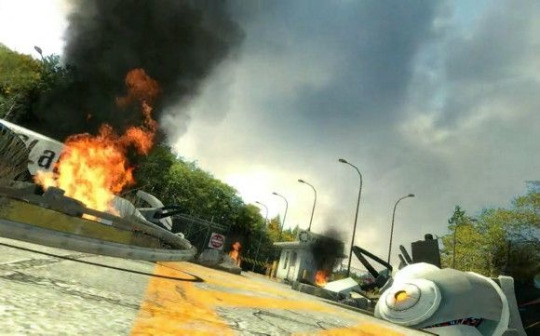
The companion cube is also pretty symbolically important to this interpretation. It’s literally a representation of someone’s heart, and you are told to protect it and preserve it under GLaDOS’ orders, and then you have to destroy it regardless of how you actually feel about doing that. You are destroying GLaDOS’ heart, so to speak.
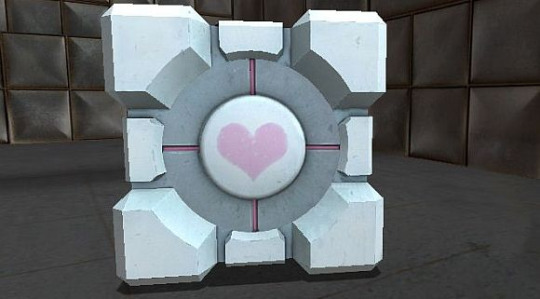
There’s also the ending song, Still Alive. The lyrics speak for themselves.

They hint that GLaDOS’ feelings about Chell are more complicated than they may appear (if she’s not being sarcastic...) and she literally talks about Chell breaking her heart (also, think back to the companion cube. Yeah.). The entire song is structurally similar to many a breakup number, with the laments of “I’m glad it happened, but also leave.”
At the end, we also see that the long promised cake GLaDOS was supposedly lying about was real the whole time. Before Portal 2 came out, it was mostly interpreted as a stinger ending (along with the nicer lyrics of Still Alive) to make you question GLaDOS’ true motives and intentions.

She actually did have a real cake waiting for you. (Side note - not really evidence, but in Argentina, “torta” means cake in Spanish. It’s also a slang term for lesbians. So. Do with that what you will). The cake is what GLaDOS offers you to lull you into the sense that she cares about you, so discovering that “the cake is a lie” wakes you up to the realization that she doesn’t. Except then the idea is subverted one last time, at the very end, showing that the cake is real and at least some of what she said she meant.
You also see the companion cube. You know, GLaDOS’ symbolic heart?
Now, okay, you might be thinking I’m extrapolating a bit too much. And you might be right. But Portal is not the only game in the series, and if you’re asking me about Cave and Caroline you obviously know about Portal 2.
Exhibit B: Portal 2
If you thought Portal was gay, Portal 2 turns that up to 11.
Even before GLaDOS wakes up, you’re treated to some visual subtext. A few of Rattmann’s drawings representing the events of Portal 2 focus a lot on the relationship between GLaDOS and Chell, with more of the cake symbolism.

In this, you can see a face layered on top of GLaDOS. This could be foreshadowing about Caroline, and likely is, but also resembles his other drawing of Chell. It insists that Chell is a part of GLaDOS, or reinforces parallels between Chell and Caroline, hinting at something either way.

In this picture, we also see Chell standing on top of GLaDOS, in the same position where the overlay of the feminine face was, again referencing the parallel. It also presents them as opposites, fundamental parts of the same thing and both connected to the same basis, but on opposing sides.
When GLaDOS wakes up, she returns to her antagonistic role, but there are more hints to something deeper just like in Portal.

Here, in her awakening lines, she references Chell not unlike an estranged ex. Also worth noting that GLaDOS is pretty much the personification of testing (in a sense, she is testing since she can control all of Aperture like an extension of her body), and insinuates that Chell loves to test. And that she reciprocates that feeling.
In test chamber 10, she says this:

It’s supposed to be threatening, but it does read as almost... sentimental.
There’s also another chamber with companion cubes in Portal 2. I already talked about their symbolism in Portal, and the same pretty much applies to them here. However, GLaDOS says something interesting about them during this level:

Once again, meant to be intimidating, ends up coming off as “well, GLaDOS, why were you going to give Chell a heart shaped representation of yourself that says ‘I love you?’” And you might think I’m stretching the GLaDOS’ heart metaphor thing a little far here, and I might agree, if the companion cubes didn’t literally sing Cara Mia for you.
Cara Mia is the turret opera from the end of the game, which is all about how much GLaDOS cares about Chell. More on that later. But the companion cubes play a song called Love as A Construct, and when you get close to them, they sing a specific part of the song that has the tune of Cara Mia. These things literally exist to sing about GLaDOS’ feelings.
Which makes this line a lot more. For lack of a better term. Tsundere-ish.

Then, right before the escape, she starts talking about the confetti from her fake surprise.

I really don’t have to explain this one. What else does GLaDOS consider an inconvenience but might miss anyway? Or, more aptly, who else?
Then, during the escape, she teases a (fake) final test chamber in front of you, and forms the panels in the shape of a heart. No, really.
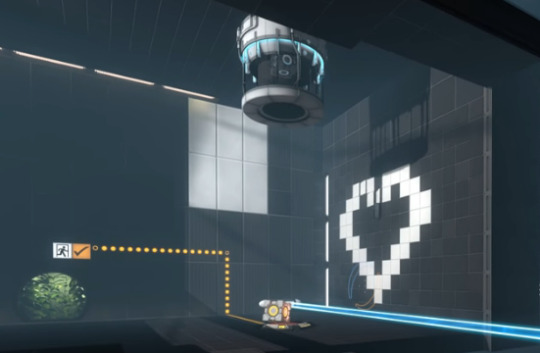
Up to this point, a lot of the points I’ve presented are interspersed with a fair amount of antagonization on GLaDOS’ behalf, more Foe Yay than anything actually hinting at something deeper than GLaDOS being conflicted about whether she loves or hates Chell. But things really ramp up after Wheatley’s betrayal, when the two of them are forced to team up. (I should also note here that “enemies to lovers” is a pretty classic queer romance trope.)
Here, GLaDOS is put on an equal level with Chell and they have to rely on each other if they want to survive. For the rest of the singleplayer campaign, GLaDOS becomes a lot nicer and even friendly to Chell. There comes a point where she starts referring to Chell as a teammate, calling them “we.” She begins to consider them one unit, two opposites unified. Here’s what she says after the lemon rant:

You can not only see her using we, but actively talking about how her and Chell are going to fight Wheatley together. There’s also that last line - “let’s explode with some dignity.” GLaDOS has fully accepted the very likely possibility that she and Chell might die together. That she might die on the same level, and the same team as Chell. And she seems... surprisingly okay with that, as long as she and Chell go together.
It’s during the Old Aperture levels that Chell and GLaDOS also discover that they have a lot in common. This is the part of the game where GLaDOS figures out she’s Caroline, that she’s human. Or, that she’s like Chell. And Chell discovers (from what we can tell anyway) that Caroline is kind, that she’s funny and smart and so many of these things she never noticed about GLaDOS before. Now also with the knowledge she is fighting alongside another human being.
You can also draw parallels between Chell and Caroline, both intelligent women ultimately betrayed by their seemingly innocuous male friends before being trapped in Aperture and forced to team up with one another in a way that will free both of them. We see that really, GLaDOS isn’t that different from Chell - she too has been imprisoned in this place against her will, but in a completely different way. Once again, the idea of two sides of the same coin applies here.
I’ve written another meta about this before, but I also think the whole idea of repressing a part of your identity and hating it, before bonding with another woman and then realizing that it’s okay to be like her and to be on her side. It’s okay to be yourself and meeting her is what helps you discover this new part of yourself. Is kinda inherently gay. GLaDOS’ discovery of her own humanity just fits so well into a queer realization narrative, to me at least.
Then, Chell and GLaDOS escape Old Aperture and have to get through Wheatley’s tests.
Here, GLaDOS isn’t just begrudgingly on Chell’s team. She’s actively helpful. She wants to help Chell solve tests, defends her from Wheatley’s insults, and makes jokes to lighten the mood. Things that can really only be explained by her caring about Chell, especially the part about the insults. See below.
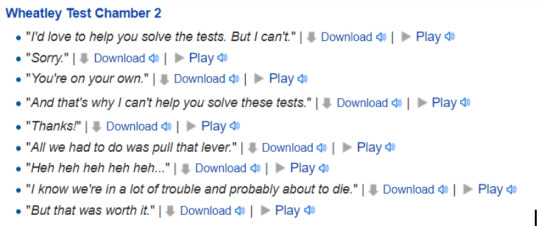

After the two escape Wheatley’s testing track, right before the boss fight GLaDOS has a few other things to say.

GLaDOS is not going to betray Chell, because of some kind of conscience. But she could easily ignore that back in her body, and yet? Here she’s deciding not to, and for no good reason. She didn’t have to say that to Chell, but she did, because she cares and she wants Chell to live.
And then, moments before the fight:

The final lines imply that GLaDOS does not think of Chell as an enemy anymore, and that it doesn’t matter what Chell thinks because they are in this together and they are getting revenge together. It’s pretty heartwarming to be honest, to know that even in a fight that will almost certainly kill you, she is there rooting for you and caring about you, even if you don’t feel the same way about her. It no longer matters to GLaDOS whether you even reciprocate - you staying alive, you making it through is enough for her.
So Chell fights Wheatley and sends him into space, all well and good, and at this point, GLaDOS has the option to kill Chell. But not only does she not, she actively saves Chell, and holds her hand in the process. If you don’t believe me:
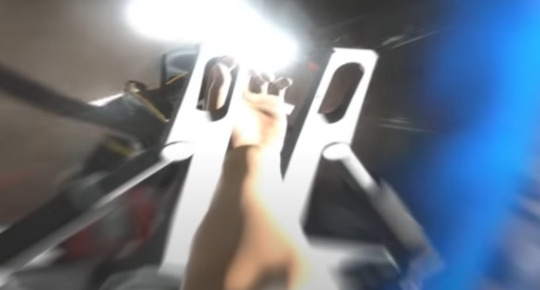
And not only that, but when Chell goes unconscious from her injuries, GLaDOS sits and waits for her to wake up. It’s also implied that GLaDOS carries her to the elevator, since it’s where she wakes up but not where she passed out. In the scene where Chell blacks out, you can also hear the part of Love As A Construct that sounds like Cara Mia. Yeah. Yeah.
If you think that this cannot possibly get any gayer, you are wrong again, because then GLaDOS makes her final speech. Which is really just a love confession, let’s be honest.

The “surge of emotion?” Do you mean love, GLaDOS? And the idea of GLaDOS considering Chell her best friend, despite everything these two have done to each other? The idea that GLaDOS, out of all people, forgives someone?
Except this isn’t even Chell’s final send-off. GLaDOS writes her an entire opera of turrets, that sing a literal love song. (Note what I said earlier about the use of the word “bambina”).

It really can’t get any more obvious than that. “My (affectionate romantic term here), my dear, I adore you.” How. Is. That. Heterosexual. In. Any. Way.
So Chell goes to the surface, set free by GLaDOS (think of the saying “if you love something, set it free), and you think that’s the end. Until GLaDOS gives you a companion cube so you aren’t alone on the journey, and from the burn marks, you know it’s your first companion cube. Her original heart, her first gift to you, a piece of her that she wants you to carry with you to remind you that she does care about you after everything. It also gives the lyrics to Still Alive a much more genuine meaning.
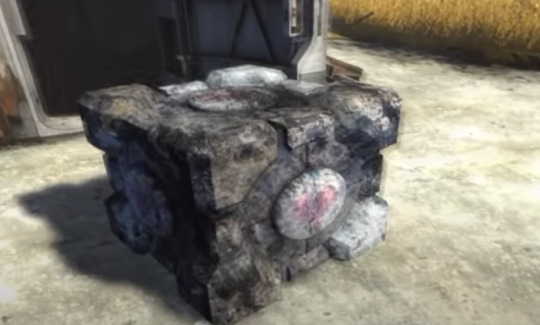
Portal 2 ends, and then the ending song, another GLaDOS number plays. Just like Still Alive, Want You Gone is structurally a break up song and very obviously about GLaDOS missing Chell and “counting on” (read: caring about/loving) Chell’s tendencies and quirks.

She’s accepted Chell completely, and yet also given Chell the one thing she wants most. Only wanting Chell gone can mean GLaDOS not wanting Chell in her life anymore, but can also mean she wants to give Chell the freedom she’s wanted for so, so long. It’s the best thing she can give.
In the co-op campaign, GLaDOS also references still caring about Chell.

And that’s the end of the Portal series. Except. Brace yourself. Despite the games being over, there is STILL more subtext somehow. It gets. Even gayer.
Exhibit C: Supplemental Evidence
Valve has made a lot of extra/cut content for the Portal series, and I’ll be looking at some of it below.

This official valentine from Valve shows GLaDOS offering a romantic partner cake, which as we’ve established before, is very symbolic of GLaDOS’ feelings about and/or relationship with Chell.
There’s a lot of other concept art and official art that emphasizes their relationship too. See below.

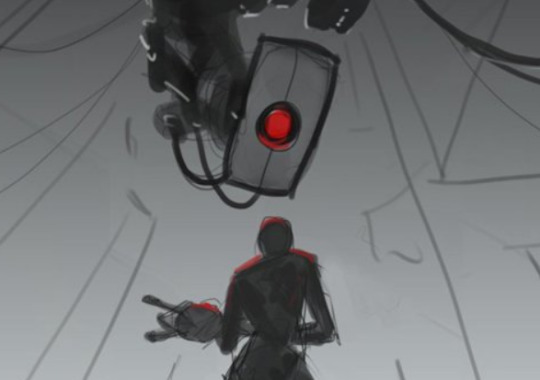
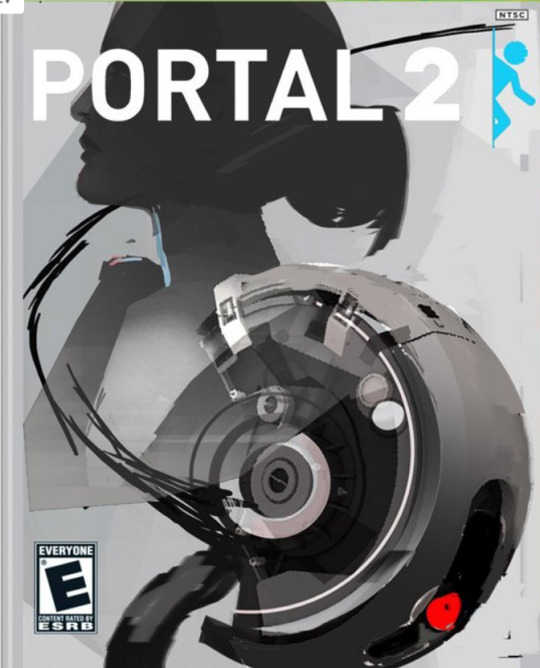
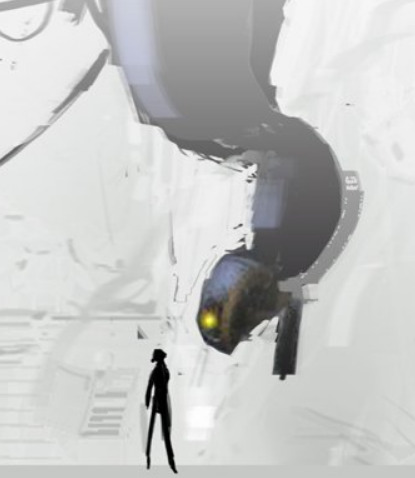
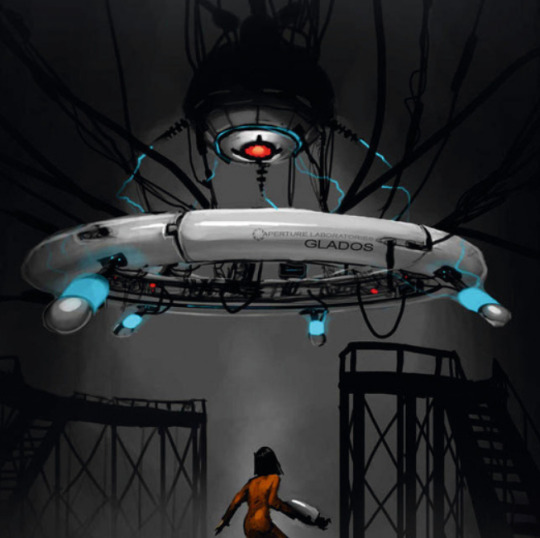


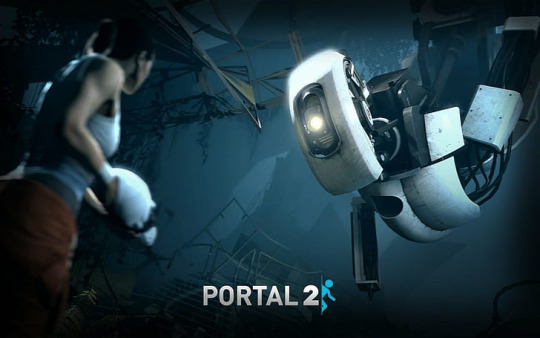
There’s also some cut GLaDOS lines that are even gayer than the source material and again, sound like confessions or references to a breakup:

The idea of “discovering things about someone”... how much more obvious can it get?
The developers have even confirmed a lot of my commentary on Chell and GLaDOS’ relationship in The Final Hours Of Portal 2. See these quotes from the book/this post:
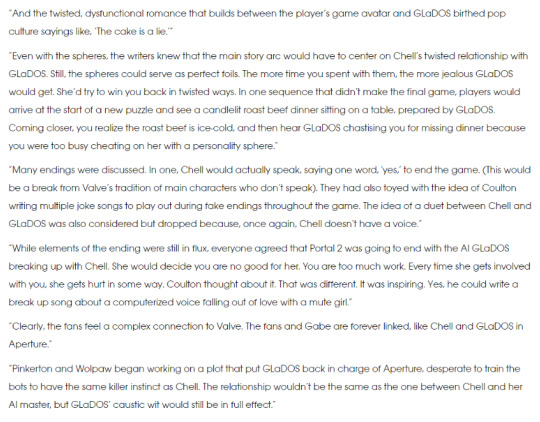
The devs literally describe it as a romance. They use terms like “cheating,” they wanted to write a romantic duet, JoCo purposefully wrote the endings like love songs. It is literally, blatantly said by the creators of the game that their relationship is interpreted romantically. By the creators of the game.
And if Word of God confirmation isn’t enough for you, have a song written for a cut alternate ending by GLaDOS’ voice actress, Ellen McClain. The song is literally nothing but GLaDOS talking about caring about Chell, about not wanting her to die/leave GLaDOS alone, about wanting to bake a cake with Chell, about waiting for Chell to wake her up. It’s so genuinely sweet and sad, and really, really romantic in the most heartwrenching way possible.
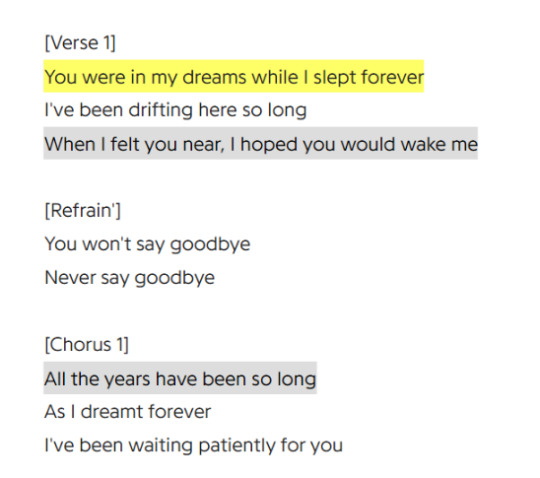
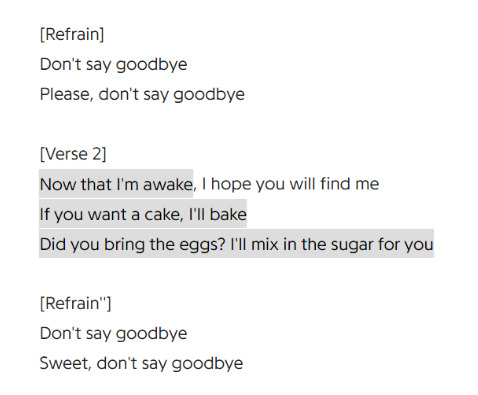

JoCo also came back for the Portal levels in Lego Dimensions, writing one final breakup song for GLaDOS to sing about Chell. It comes off as GLaDOS not wanting to admit she misses Chell even though she obviously does, trying to replace their relationship but failing, and even explicitly forgiving Chell/wanting her to come back.
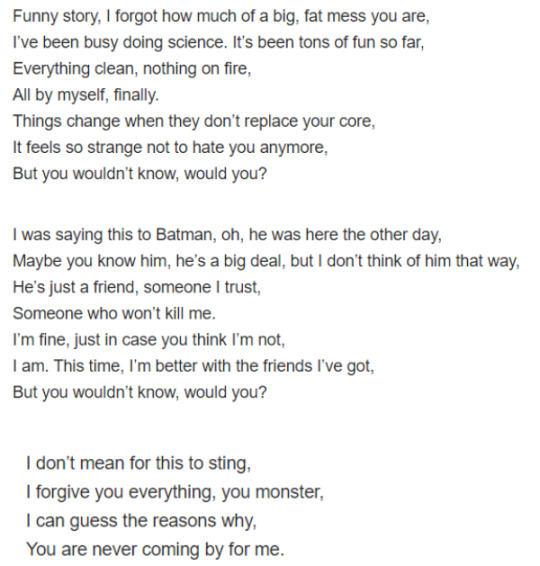

Also, the “finally I understand,” as if only now GLaDOS understands just how deep her feelings for Chell are... What else can I say?
In Lego Dimensions, GLaDOS also outright rejects anyone who isn’t Chell.

In Conclusion:
Why do I ship Chell and GLaDOS?
Well, ultimately, it doesn’t matter whether I ship them.
Because I think it’s glaringly obvious Portal does.
3K notes
·
View notes